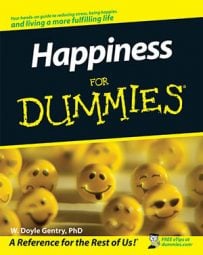Benefit-finding and happiness are not automatic things. You don’t suddenly think in the midst of some unfortunate circumstance in life, “Wow, this isn’t that bad after all.” Benefit-finding is a process — one that takes energy, requires that you forge closer ties to those around you, and involves several stages of readjustment
Redirect your energies to find happiness
Dealing with adversity takes a lot of energy — physical and psychological — especially when you see your circumstances as beyond your control. Initially, what little energy you have can easily end up being channeled into negative thoughts, feelings, and actions, which keep you from moving forward with your life.
Ben, a pessimistic young man with the bad back, is a good example. He stayed angry for 11 years between the time of his disabling accident and his death. His wife wasn’t surprised that he dropped dead in the middle of an angry conversation on the phone one morning — she had been waiting for that day to come for a long time.
As an expression of his never-ending anger, Ben had refused to associate with any of his former coworkers, rebuking them even when they reached out in compassion.
Too much of Ben’s energy was focused on his past and all the losses he had suffered because of his injury. A lot of his energy was also directed at ways to just survive the day — venting his anger on anyone who would listen in an effort to relieve built-up tension.
He would move back and forth from the recliner to the bed seeking comfort, and resisting efforts by family and friends to do something productive with his life. Ben loved children and he had been a baseball player in his youth, so he was repeatedly invited to coach his son’s little league team. His answer was always the same — no!
Shift your time frame. The benefit you’re seeking has to do with the future, not the past. Sitting around ruminating or sulking about the past will only keep you “stuck” where you are – in a state of perpetual distress. Make sure your mind stays focused on the days, weeks, and months ahead.
Focus on what you can control, not what you can’t. Ben can’t control his pain or get back all the things he lost because of it. What he could do instead is think about all the countless things he still can do which he’s not because he’s mired down in self-pity and regret. Think ability rather than disability.
Be productive in both thought and deed. Reliving a trauma that happened to you years ago day after day is counter-productive if you’re looking for a way to achieve a moment of happiness — all it does is bring back pain. Resisting all efforts to get you back into the mainstream of life is also counterproductive.
Forge closer ties to those around you to find happiness
The vast majority of benefit that people find in the aftermath of misfortune comes from their interpersonal relationships — their connections to other people. People end up forging closer ties to those around them. How do they do that? They do it by taking the following advice:
When loved ones offer you support, accept it with appreciation instead of pushing it away. This is no time for foolish pride which only keeps people at a distance. People want to help, so let them. And, always remember to say “thanks.”
When others offer compassion and empathy, respond in kind. Remember: You’re not the only one in the world who’s hurting in some way. People need you as much as you need them.
Educate others about your problem. You have to tell your story in a way that helps those around you understand all of what you’re going through and why you’re meeting the challenge the way you are. Don’t whine — educate!
Discover the kindness of strangers. Friends often start out as strangers who want to help and the relationship evolves from there. If you turn away the kindness, you offend the person on the other end.
Foster better relationships with professionals whose help you need. Doctors and lawyers are human beings too — it never hurts to ask them “How are things with you? How’s your son doing?”
Make the necessary adjustments to be happy
When human beings face life-altering challenges, they have to make adjustments. In doing so, they must do three things:
They evaluate the situation. “What just happened? How bad is it?”
They make judgments about the situation. “I really don’t think I can handle this.” “This will work out.”
They react to the situation. “I’m going to make someone pay for this.”
But, these evaluations, judgments, and reactions are subject to change over time. The changes are predictable and follow a rather specific pattern or sequence (known as stages of adjustment).
The first stage is called turnaround because what you really want initially is to believe that your misfortune can be fixed or reversed. The problem is that the kind of challenges many face — cancer, lupus, arthritis, loss of a child, severe depression — can’t be undone.
The second stage has to do with survival, which typically involves a roller coaster of emotions — anger, sadness, fear — which is anything but enjoyable.
If you’re lucky, you progress to the third stage — reconstruction. This final stage is the “good news,” stage and this is where benefit-finding comes into play. As you begin to move beyond survival, you start to behave in ways that increasingly bring joy back into your life.

